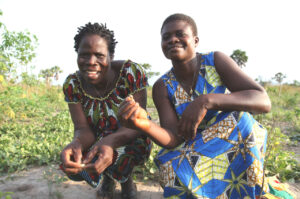Gender and the seed sector
Women play a crucial role in the seed sector in Africa, where agriculture is a key driver of economic growth and food security. In many African countries, women are responsible for producing the majority of the food consumed, and they are also key players in the production, marketing, and distribution of seeds.
According to a report by the Food and Agriculture Organization (FAO), women represent around 50% of the agricultural labor force in Africa, and in some countries, they make up over 60% of the agricultural workforce.
Women's involvement in the seed sector takes many forms. In some cases, women are seed producers, using traditional knowledge and practices to grow and save seeds for their own use or for sale in local markets. In other cases, women are involved in seed production and distribution through formal channels, such as seed companies or cooperatives. They may also be involved in research and development, working as scientists and breeders to develop new varieties that are better adapted to local conditions and more resilient to climate change.
Gender inequalities
Despite the important role that women play in the seed sector, they often face significant challenges that prevent them from participating fully in the seed sector. They are often concentrated in lower-paying, less secure jobs, and have limited access to resources and training opportunities. Here are some statistics related to these challenges:
Limited access to resources:
- According to the International Food Policy Research Institute (IFPRI), women in Africa have less access to productive resources such as land, credit, and inputs like fertilizers and seeds compared to men. For example, a study in Zambia found that only 11% of women had access to credit, compared to 14% of men.
- In Ethiopia, only 15% of rural women have access to credit, compared to 20% of men.
- In Mali, only 8% of women own land, compared to 29% of men.
Lack of education and training:
- UNESCO reports that the literacy rate for women in sub-Saharan Africa is 47%, compared to 70% for men.
- According to the African Development Bank, only 7% of women in sub-Saharan Africa have completed secondary education, compared to 13% of men.
- Women also have lower levels of agricultural training and extension services. In Uganda, for example, only 6% of women farmers received agricultural extension services, compared to 9% of male farmers.
Cultural and social barriers:
- According to the African Union, cultural norms and traditions that discriminate against women continue to limit their participation in the seed sector. For example, in some communities, women are not allowed to own land or inherit property, making it difficult for them to access resources and participate in decision-making processes.
- Women also face social and cultural barriers in accessing markets and marketing their products. For example, in some communities, it may be culturally unacceptable for women to interact with male traders, making it difficult for them to sell their products.
- In addition, women's multiple roles and responsibilities, including household and caregiving duties, often limit their time and ability to participate in training and decision-making processes in the seed sector.
To address these challenges, there are a growing number of initiatives aimed at promoting gender equity in the seed sector, such as providing women with access to credit, training, and markets, and involving them more fully in research and development activities.
Capacity building initiatives
AfricaSeeds is engaged in developing the skill sets of rural women in the field of quality seed production and seed entrepreneurship, acknowledging the fact that this can positively impact food security, financial sustainability, biodiversity conservation, and climate resilience. These objectives are essential for the attainment of the Sustainable Development Goals and poverty reduction in rural communities.
More specifically, here are some of the benefits of cclosing the gender gap in the seed sector:
- Improved food security: Rural women play a crucial role in food production and are responsible for a significant proportion of the world's food supply. By building their capacity in seed production, women can improve the quality and quantity of the seeds they produce, which can lead to increased crop yields and improved food security for their families and communities.
- Income generation: Seed production can be a profitable business for rural women, providing them with a source of income and greater economic independence. By building their capacity in quality seed production, women can produce higher-value seeds that can fetch a better price in the market, increasing their income and contributing to the economic development of their communities.
- Biodiversity conservation: Rural women often possess traditional knowledge and practices related to seed production and conservation, which can contribute to the conservation of local varieties and genetic diversity. By building their capacity in quality seed production, women can play a key role in conserving traditional crop varieties and protecting biodiversity.
- Climate resilience: Quality seed production can also contribute to climate resilience, as it can help to ensure that crops are better adapted to changing climatic conditions. By building their capacity in quality seed production, rural women can produce seeds that are more resilient to drought, pests, and disease, helping to mitigate the impacts of climate change on agriculture.
Efforts deployed by AfricaSeeds to support women in the seed sector
AfricaSeeds strengthens the entrepreneurial skills of women seed producers in Côte d’Ivoire
AfricaSeeds supports small-scale entrepreneurship in the seed sector for youth and women in Africa
